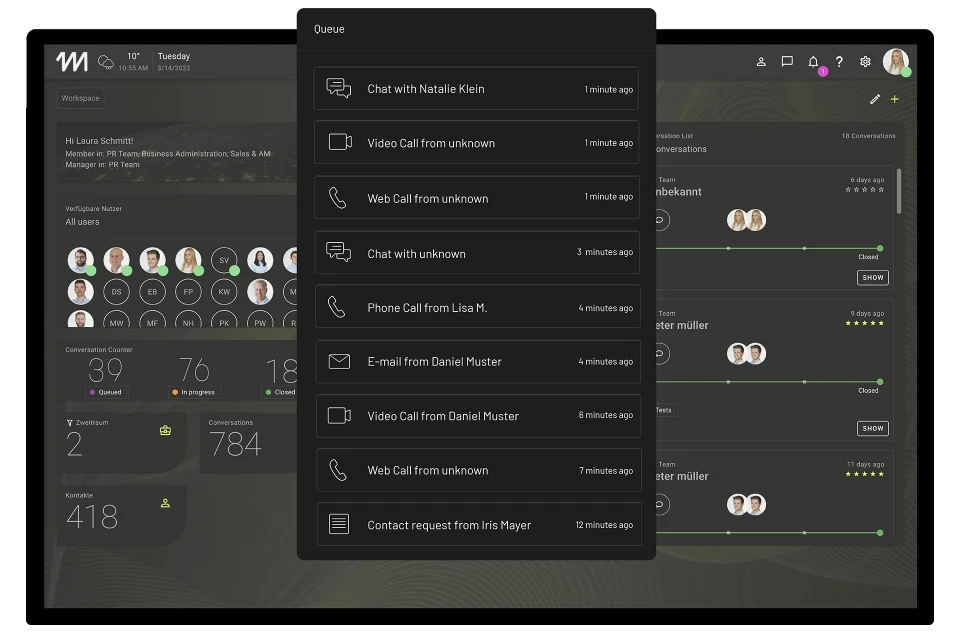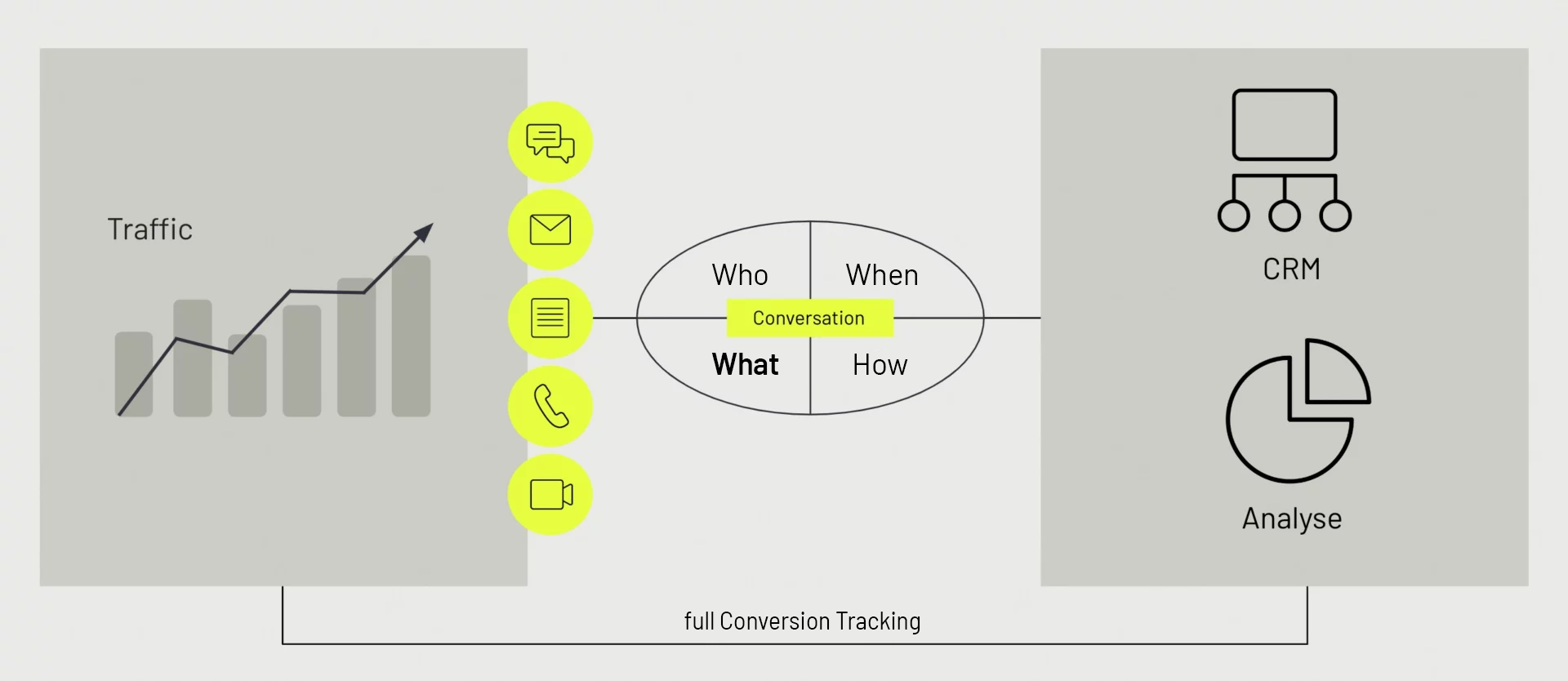Effective and flexible Customer Communication (CC) influences all aspects of a business – from the initial contact with potential customers via digital applications, through the various stages of marketing and the buying process, to all customer engagement and customer experience activities.
Communication with consumers is currently characterized by an increasing degree of digitalisation – many companies still need to build up more expertise in this area and use new innovations. This development is continuously replacing the previously tedious and sometimes cumbersome communication methods with data-driven approaches and strategies. These new possibilities and applications create a much more efficient and value-adding environment for communication. That sounds great at first, doesn’t it?
However, the digitalisation of communication management also has its downsides: More digital communication always means a steadily increasing number of communication platforms (social media, mail, newsletters, display advertising, etc.) Many companies have difficulties keeping up with this. What initially sounds like a win-win situation inevitably leads to increased complexity.
New, consistent solutions and in-depth know-how for this development are needed to meet the increasing demand for communication. Developing these competencies can make life a lot easier for decision makers.
Organizations – and marketers in particular – have to master this new situation in order to successfully implement their strategies and continuously manage and provide relevant information. But digitalisation also offers a solution for this: so-called Customer Communication Management platforms (CCM) that complement the existing system landscape.
Table of content
- A definition: What is Customer Communication Management?
- What can efficient Customer Communication Management achieve?
- 5 advantages of innovative CCM platforms
- Benefit 1: Personalize and automate communication
- Benefit 2: Track and optimize leads
- Benefit 3: Build and improve Customer Experience
- Benefit 4: Strengthen digital transformation
- Benefit 5: Increase efficiency
- CCM vs. CRM
- Trends in CCM
- Trend 1: Cloud-based CCM
- Trend 2: Optimize and deliver content
- Trend 3: Analyse content
- Communication based Lead Management
A definition: What is Customer Communication Management?
CCM is a strategic approach to orchestrate, manage, track and store inbound and outbound communications between companies and customers. The insights gathered in this way are then used to optimize the entire customer communications management and output management as well as to gain more leads. CCM tools bundle all conversations on a central platform and thus make the information seamlessly accessible and usable throughout the company.
Or, to put it another way: the core tasks of these communication systems are to support marketing in interacting with potential customers and successively developing them into qualified leads, as well as to fundamentally improve processes by implementing and integrating other suitable software solutions.

What can efficient customer communication do across all communication channels?
Efficient communication approaches continuously generate relevant data necessary for managing all types of communication with customers. With a well thought-out strategy, companies can use cloud-based tools to capture and analyze all communication via mail, chat, (video) call or contact forms in real time. The collected data can then be used to generate important insights into customers’ communication and decision-making processes, which then lead to better decisions at all levels of the company – especially in marketing and sales.
5 advantages through the connection of CCM platforms
Advantage 1: Individualise and automate communication
With digital CCM platforms, companies can individualize and largely automate the entire communication with their customers. In this way, existing customer communication processes and systems can be significantly and relatively easily and quickly strengthened – company-wide and silo-free. All users, regardless of their department, have access to rule-based data in the customer communication system at any time and from any location and can integrate it seamlessly into their respective workflows – a real empowerment for all users.
CCM solutions also organize the entire correspondence between companies and customers via the interaction channels offered – from the creation of personalized documents to the storage of the acquired customer data. Furthermore, they uncover weaknesses based on communication patterns, provide direct recommendations for action to eliminate them and deliver optimization suggestions for document creation. This is where technology such as AI and Big Data often come into play.
But customer communication platforms also help set up new templates, auto-responders and other tools to speed up and streamline messaging. All of this is happening in the cloud.
Advantage 2: Track and optimize leads
In order to be able to optimize leads and customer contacts at all, a system must first be in place to visualize them and make them traceable. Because: If several communication channels are used simultaneously, miscommunication and message overlaps are almost pre-programmed. They make customer communication unnecessarily complex and in the long run frustrate not only the customers but also the company’s own employees – a real brake on productivity and efficiency. It is always important to remember: customers simply want someone to actively communicate with them and respond promptly.
Customer communication solutions can remedy this by reducing reaction time and tracking all communication between customers and different departments in your company so that no conversation goes unnoticed. This ultimately streamlines the whole process and ensures that every engagement is accounted for. Happy employees make for happier customers and vice versa.
Advantage 3: Build and improve the Customer Experience
The simple rule applies: the more customer-centric the communication strategy is designed and implemented, the better the Customer Experience and customer satisfaction. In essence, it is always about building good and appreciative relationships with (potential) customers through customer communications management – a CCM solution often complements an existing CRM.
A modern communication platform enables companies to anticipate the continuously changing requirements, habits and wishes of customers and to plan and optimize campaigns and other marketing measures accordingly. This is done through deep insights and implementation power in the following areas:
- Customized experiences
- Real-time content creation, management and delivery
- Multi- and cross-channel communication
- Interactive communication
- 24/7 customer service
A stringent CCM strategy always puts the customer at the center. It automates and simplifies the answering of the four W-questions of communication: WHO gets WHAT information via WHICH channel at WHAT time. This contributes significantly to improving and strengthening the exchange between customers and companies, improving customer loyalty and creating an integrated Customer Experience.
In this way, companies can improve their customer retention rates, massively reduce the costs for lead generation and generate higher conversion rates as well as better -data. The result is an automatic increase in Customer Experience and satisfaction.
Advantage 4: Strengthen digital transformation
Many companies, especially in the SMB sector, have developed massively in recent years with regard to the topic of digitalisation, but are still far from being on a par with their competitors abroad or with many of their customers. They are, however, increasingly feeling the pressure to adapt to the digital habits in terms of decision-making and communication processes of their target groups. To achieve this, efforts must be made, especially in the area of marketing, to strengthen customer communication in the relevant places: in digital channels and on platforms.
The most important digital communication channels are:
- Text messages and chats
- Mails
- Phone calls
- Video conferences
- Web pages
- Social media
- Sales platforms and e-shops
In this whole process, customer communication is one of the most relevant drivers – without it, the company-wide digital transformation in many companies would not yet be at its current level. This is evident in the banking and finance industries, for example, which use digital channels and platforms to orchestrate all aspects of customer communication – including CRM, customer account management, customer service and product marketing.
For companies with complex IT infrastructures, CCM platforms also offer additional added value: they allow them to massively shorten the toolchain and make all their customer communication available on a central user interface across the company and independent of departments.
Advantage 5: Increase efficiency
The platforms offer companies many helpful resources to assess business needs and make operations more efficient. First and foremost: Customer Communication Management. Because often, those in charge simply don’t know where and how to begin to effectively address identified communication failures. In some cases, they even lack a tool that makes them aware of these errors in the first place and then visualizes them. This leads to misunderstandings, frustrations and disrupted workflows, making systems slow and inefficient. This then affects both the company staff and the customers.
CCM tools reduce the workload of IT staff as well as those who take care of communication in the company – mostly the marketing department – by efficiently automating processes. Efficient communication helps align marketing, sales, customer service and other areas.
Simply put: Customer Communication Management systems improve cross-team interaction and provide a consolidated environment for different touchpoints. This lowers operational costs, promotes smooth communication, reduces inconsistencies and risks, and improves overall operational efficiency.
CCM vs. CRM
Customer Communication processes and CRM are often confused because they both deal with communication between customers and companies and often have an interface. However, this could not be more wrong.
A definition: What is CRM?
CRM is a strategic approach with which companies plan, control and implement their interaction processes with (potential) customers. CRM must always be understood and implemented across companies and departments. It is important to integrate all areas from sales and marketing to customer care and corporate management, as this is the only way to map and address all phases of the customer life cycle.
Here is a comparison of the many facets of the two areas:
| CCM | CRM |
| A strategic approach to improving customer interaction and business processes | A strategic approach to managing customer interactions and personalization |
|---|---|
| CCM is often used with other technologies and thus provides, among other things, methods for omnichannel communication (e.g. the parallel use of several channels to improve the Customer Experience) | CRM is predominantly concerned with the unified management of different disciplines such as marketing, sales and customer care in order to strengthen customer relationships and often complements an already existing solution architecture; in addition, it supports conversions |
| CCM can be used in a variety of ways, including internal communication of upcoming events in companies (e.g. billing, subscription/contract renewals and similar upcoming events) | CRM is focused on contact, sales and marketing to understand and address customer needs at customer preferred touchpoints |
| CCM solutions are more advanced than CRM tools | CCM platforms complement CRM solutions and improve their performance |
| A concrete advantage over CRM: CCM systems improve the quality and output of communication and content | A concrete advantage over CCM: CRM solutions improve productivity and efficiency across all communication processes |
Trends in CCM
Digital solutions for communication management ensure a smooth transition from inefficient to good communication processes. This is achieved through various features that make CCM a viable option for all communication needs. Here are the most important trends in CCM:
Trend 1: Cloud-based CCM
Cloud-based CCM solutions are a big improvement over on-premise solutions – such as legacy IT systems that use outdated technology but remain in use. Cloud technology helps to reduce and prevent data silos in different departments, as all stakeholders can collaborate on a central platform and always have access to the data. This provides more data transparency across the organization.
This technology also significantly drives the digital transformation of companies and is therefore a real catalyst. For example: CCM platforms offer the ability to use predictive analytics to provide real-time forecasts of future customer needs from collected data sets. These insights then directly strengthen customer satisfaction and experience, as well as uncover new business opportunities.
Trend 2: Optimize and deliver content
Two of the main topics of modern CCM systems are automation and content personalization.
First, CCM platforms offer a variety of predefined templates for personalized messages (invoices, letters or contract templates). In this way, they help companies to significantly streamline processes by enabling quick revision and updating of these documents. This saves time and money and frees up resources for the important things … communication with customers.
Trend 3: Analyze content
Analyzing user behavior and trends is no easy task. But with CCM solutions, it is easy to understand how users or customers react to specific content.
CCM tools analyze trends and patterns in customer interactions to gain valuable insights. For example, if marketers know what works for their customers, they can easily use these insights to optimize content and campaigns to make them even better.
Our service – matelso platform for a communication based lead management
In this article you have learned a lot about how CCM systems work and what they can do. You also learned about the interaction with and differences between this platforms category and other solutions such as CRM software.
Our innovative matelso approach goes one step further: we don’t just improve CCM processes. With our cloud-based matelso platform for a communication based lead management, we combine the best of CCM solutions with the power of value-added Customer Relationship Management systems, bringing these two worlds together. Marketers can bundle all contacts via conversational communication channels (chat, video, call, email, forms, etc.) on their website in a central system and make them available to all stakeholders across the company. And the best thing about it: Our communication based LM platform can be integrated seamlessly into all CRM systems and analytics tools.

The matelso platform bundles all contacts in one central location and makes the data available to all stakeholders – company-wide and without silos.
Companies benefit from the following advantages with the matelso platform:
- The entire marketing and LM process becomes more transparent and efficient
- Valuable insights about the customer journey are available
- CRM and analytics tools are directly integrated
- The toolchain is massively shortened, making the IT infrastructure less complex and resource-intensive
The matelso platform thus improves all decision-making processes. The company generally becomes faster, stronger and more successful!



